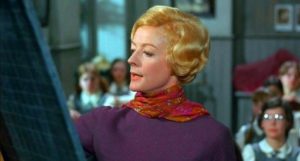 Maggie Smith won a Best Actress Oscar for the title role of this 1969 film about a teacher at a private girls school in 1930s Edinburgh.
Maggie Smith won a Best Actress Oscar for the title role of this 1969 film about a teacher at a private girls school in 1930s Edinburgh.
Those who only know Maggie Smith from her roles in later life—such as, most famously, in the Harry Potter films and Downton Abbey, I recommend checking out The Prime of Miss Jean Brodie, from 1969, for which she won the Academy Award for Best Actress at the age of 34. She was devoted to the stage for most of her early career, with film appearances being relatively rare, and this film makes me consider that a great loss for the cinema.
The Prime of Miss Jean Brodie is adapted from a very sharp and clever short novel by Muriel Spark, and a play based on that novel by Jay Presson Allen, who also wrote the screenplay. Maggie Smith plays Miss Brodie, a teacher at a well-to-do private girls school in 1930s Edinburgh. She stands out from all the other teachers because she involves the students in interesting discussions, often about unusual subjects, and encourages the girls to express their individuality. Her views on art, literature, and especially sexual relations are daring and defiant, and they frequently get her into trouble with the school’s more conventional head mistress.
I don’t think you could find many better examples of an actor becoming a role—“inhabiting it,” as they say—than what Maggie Smith does in this film. Miss Brody’s warm and vivacious manner is undercut by a sense of grasping insecurity, conveyed by Smith’s eyes, hands, and mannerisms. Her initial impression gives way to increasingly ambivalent character traits.
Miss Brody attracts a circle of girls who idolizes her, and she carefully grooms them to embody certain aspects of her desires and self-image. One of them is Sandy, played by Pamela Franklin, initially a worshipper of Miss Brody, but gradually coming into her own. Franklin was a fairly well-known British child and teenage star who here makes a transition to adulthood on screen that is terrific and quite unexpected in its effect.
The director was Ronald Neame, notable throughout his career for his skill with actors. Everything is so smooth in this picture that the general staginess of play adaptations is almost completely absent. The costumes and the production design are, dare I say it, perfect. This is a movie for grown-ups—I wasn’t able to appreciate the complex themes that were being explored when I first saw this film as a young man.
Among the intricacies of the story is a thread involving fascism—Miss Brody urges enthusiasm in her students for General Franco’s crusade during the Spanish Civil War occurring at the time of the story. The link between the common hero-worship of young people for a charismatic teacher and the appeal of fascism manages to be both witty and tragic. In addition, the sexual politics of the film was, even for 1969, ahead of its time. It would be a mistake to consider The Prime of Miss Jean Brodie as an argument for conservatism. Rather it is an example of bright, critical thinking, no matter where such thinking might lead.

